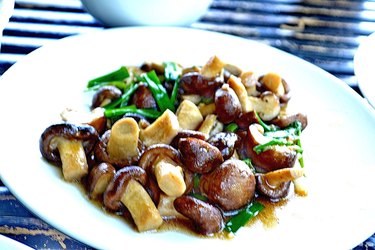
Used in Chinese cooking, oyster sauce is made from oyster extract. Oysters are boiled in water and the cooking liquid is reduced. Caramel darkens the sauce, cornstarch thickens it and soy sauce adds a smoky saltiness.The result is used in meat and vegetable dishes, and a little oyster sauce goes a long way. Typically, only 1/4 cup is added during cooking. This means that a serving size is approximately 1 tablespoon.
Calories and Fat
Video of the Day
If you are looking for a novel way to add flavor to dishes without adding a lot of calories, you might want to try oyster sauce. There are only 9 calories in 1 tablespoon of oyster sauce. With no cholesterol and insignificant amounts of fat and saturated fat, oyster sauce will not derail your efforts to maintain a healthy weight. Fiber content is low as well, with only 0.1 g fiber.
Video of the Day
Protein
One tablespoon of oyster sauce has 0.24 g protein. This insignificant amount of protein is less than 1 percent of the recommended protein for adults and children. Instead of looking to oyster sauce to provide protein, you might want to use it to flavor tofu, chicken, fish and other high protein foods. If you are using oyster sauce in a tofu dish, try brushing the tofu with oyster sauce before cooking so that the taste absorbs into the tofu.
Vitamins and Minerals
One tablespoon of oyster sauce doesn't have appreciable amounts of vitamins or minerals. Chefs should rely on the nutrients of the main ingredient, rather than the nutrients of this sauce, to provide substance in a meal.
Sodium
The only mineral found in any appreciable quantity in oyster sauce is sodium. With 492 mg sodium in a single tablespoon, this sodium content of this sauce makes it almost impossible to follow the American Heart Association's recommendation to limit sodium consumption to less than 1,500 mg for the entire day. If you are cooking a meal with oyster sauce, try to compensate by eating fewer sodium-rich foods.